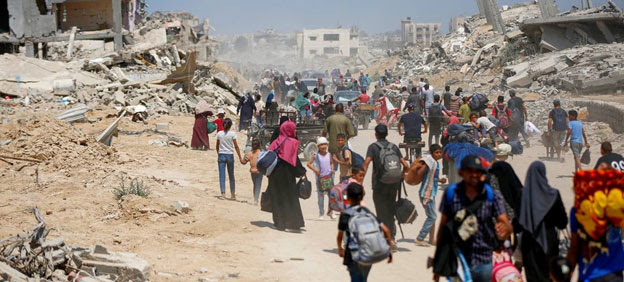UN Arms Embargo on Israel: Dead on Arrival
UNITED NATIONS, 11 Nov 2024
Thalif Deen | Inter Press Service – TRANSCEND Media Service
8 Nov 2024 – When the United Nations imposes sanctions or penalizes a member state – be it the General Assembly or the Human Rights Council – the resolutions are “non-binding” and often remain unimplemented.
But the Security Council resolutions are “binding” – and still openly violated by countries such as North Korea—because all these UN bodies have no means of implementing these resolutions, nor a standing army to forcibly enforce them. But they only carry moral weight.
The Council can also impose its own sanctions, mostly in economic, financial and trade sectors, against violators of its decisions.
And last week there was a move to impose arms sanctions against Israel – and rightly so, judging by the 43,000 plus, mostly Palestinian civilians, killed in Gaza largely with US-supplied weapons since October last year.
But how effective will this be since the strongest opposition will come from the US, an unyielding supporter of Israel, which will unhesitatingly use its veto power if the resolution comes before the Security Council?
Ambassador Anwarul K. Chowdhury, a former UN Under-Secretary-General and one-time Permanent Representative of Bangladesh to the United Nations, told IPS anything short of a real, permanent ceasefire would not create a pathway to end the perpetration of the ongoing genocidal aggression by Israel.
In this context, he said, the joint letter calling on all countries to stop the sale of arms and ammunition to Israel, signed by 52 countries and two UN-recognized multilateral organizations, is meaningfully forward-looking, and contains a purposeful objective of contributing to that “pathway”.
In fact, the Foreign Minister of Turkiye, whose country initiated the letter, asserted that “We must repeat at every opportunity that selling arms to Israel means participating in its genocide.”
“It would be argued rightfully that the United Nations and its apex body, the General Assembly have no powers to enforce such an arms embargo. The Security Council, the sole UN entity which can authorize an arms embargo and obligate the arms suppliers desist from sending arms to the areas of conflict, also becomes powerless if one of the P-5 uses the notorious veto.
“However, I strongly believe that a General Assembly resolution following the call for the arms embargo to Israel would have a moral value which has its own merit. Despite the politics and power-play which is destroying the UN’s credibility and marginalizing its operational capacity to resolve conflicts, the arms embargo would highlight the principled position taken by the UN,” said Ambassador Chowdhury.
In a way, he pointed out, that would strengthen the Secretary-General’s efforts to promote the much-needed ceasefire.
In the aftermath of Israel’s declaration of the Secretary General as persona non-grata (PNG) and its extension of the attacks on UNIFIL in Lebanon, the General Assembly needs to show that its moral and normative role as envisaged in the UN Charter has not been cowed down by the politics of the frequently-used threat of veto, he declared.
Stephen Zunes, Professor of Politics and International Studies at the University of San Francisco, who has written extensively on the politics of the Security Council, told IPS: “This initiative reflects the view of the vast majority of the world’s governments and peoples and is consistent with imperatives of international humanitarian law, but given that the major arms supplier of Israel is a veto-wielding permanent member of the Security Council, it is unlikely to have much of an impact.”
Also problematic, he pointed out, is that some of the countries sponsoring the initiative, such as Russia and Saudi Arabia, have been guilty not only of similarly providing weapons to those engaging in war crimes but engaging in war crimes themselves.
Turkiye’s foreign minister Hakan Fidan said last week his country had submitted a letter to the United Nations, signed by 52 countries and two inter-governmental organizations, calling for a halt in arms deliveries to Israel.
“We have written a joint letter calling on all countries to stop the sale of arms and ammunition to Israel. We delivered this letter, which has 54 signatories, to the UN on November 1,” said Fidan, according to the Times of Israel.
“We must repeat at every opportunity that selling arms to Israel means participating in its genocide,” said Fidan, adding that the letter is “an initiative launched by Turkiye.”
Among the signatories were Saudi Arabia, Brazil, Algeria, China, Iran and Russia, plus the Arab League and the Organization of Islamic Cooperation (OIC),
Elaborating further, Ambassador Chowdhury said the UN should not forget that the UN’s International Court of Justice which determined that Israel’s occupation of the Gaza Strip and West Bank is illegal under international law. The judgment was followed by a General Assembly resolution last September, demanding Israel leave the occupied territories within a year.
“I am encouraged by the UN’s own 45 Human Rights Experts and Special Rapporteurs, who, driven by their conscience, forcefully called for a ‘permanent ceasefire, … an ‘arms embargo on all warring parties,’ and ‘the deployment of an international protective presence in the occupied Palestinian territory under the supervision of the UN.’ All these well-thought-out measures would only promote dialogue and diplomacy over death and destruction”.
The UN Secretary-General needs to endorse and welcome this call by his in-house experts and recommend to the General Assembly to do the same without any delay, he declared.
Back in April 2024, in a resolution adopted by 28 votes in favour, six against and 13 abstentions, the 47-member Human Rights Council backed a call “to cease the sale, transfer and diversion of arms, munitions and other military equipment to Israel, the occupying Power…to prevent further violations of international humanitarian law and violations and abuses of human rights”.
Presented by Pakistan on behalf of the Organization of Islamic Cooperation, delegates heard that the resolution had also been motivated by the need to stop “egregious” human rights violations in the Occupied Palestinian Territory.
Co-sponsors of the text included Bolivia, Cuba and the State of Palestine, ahead of the vote which saw support from more than two dozen countries including Brazil, China, Luxembourg, Malaysia and South Africa, according to UN News.
Unlike the UN Security Council, Human Rights Council resolutions are not legally binding on States but carry significant moral weight, and in this instance is intended to increase diplomatic pressure on Israel as well as potentially influence national policy decisions.
Israel’s two largest arms sources, the United States and Germany, have resisted calls for an embargo on Israel, though each has been accused of withholding certain arms during the war.
In an October 2024 report, the Stockholm International Peace Institute (SIPRI) said in the past decade, Israel has greatly increased its imports of arms. SIPRI estimates that in the five-year period 2019–23, Israel was the world’s 15th largest importer of major arms, accounting for 2.1 per cent of global arms imports in the period. In 2009–13 it ranked only 47th.
Although only three countries supplied major arms to Israel in 2019–23, the United States, Germany and Italy, many others supplied military components, ammunition or services. The three other global major arms exporters among the top 10: the United Kingdom, France and Spain.
________________________________________________
 Thalif Deen, Director, Senior Editor, UN Bureau, Inter Press Service (IPS) news agency, has been covering the United Nations since the late 1970s. As the former UN Bureau Chief for Inter Press Service, he was cited twice for excellence in U.N. reporting at the annual awards presentation of the U.N. Correspondents’ Association (UNCA). In November 2012, he was on the IPS team which won the prestigious gold medal for reporting on the global environment– and in 2013 he shared the gold, this time with the UN Bureau Chief of Reuters news agency, for his reporting on the humanitarian and development work of the United Nations. A former information officer at the U.N. Secretariat, he served twice as a member of the Sri Lanka delegation to the UN General Assembly sessions. His track record includes a stint as deputy news editor of the Sri Lanka Daily News and senior editorial writer on the Hong Kong Standard. A former military editor Middle East/Africa at Jane’s Information Group, a columnist for the Sri Lanka Sunday Times and a longtime U.N. correspondent for Asiaweek, Hong Kong and Jane’s Defence Weekly, London, he is a Fulbright scholar with a Master’s Degree in journalism from Columbia University. He can be contacted at thalifdeen@ips.org
Thalif Deen, Director, Senior Editor, UN Bureau, Inter Press Service (IPS) news agency, has been covering the United Nations since the late 1970s. As the former UN Bureau Chief for Inter Press Service, he was cited twice for excellence in U.N. reporting at the annual awards presentation of the U.N. Correspondents’ Association (UNCA). In November 2012, he was on the IPS team which won the prestigious gold medal for reporting on the global environment– and in 2013 he shared the gold, this time with the UN Bureau Chief of Reuters news agency, for his reporting on the humanitarian and development work of the United Nations. A former information officer at the U.N. Secretariat, he served twice as a member of the Sri Lanka delegation to the UN General Assembly sessions. His track record includes a stint as deputy news editor of the Sri Lanka Daily News and senior editorial writer on the Hong Kong Standard. A former military editor Middle East/Africa at Jane’s Information Group, a columnist for the Sri Lanka Sunday Times and a longtime U.N. correspondent for Asiaweek, Hong Kong and Jane’s Defence Weekly, London, he is a Fulbright scholar with a Master’s Degree in journalism from Columbia University. He can be contacted at thalifdeen@ips.org
Tags: Embargo, Ethnic Cleansing, Gaza, Genocide, Israel, Palestine, UNGA, UNSC, USA, United Nations, West Bank
DISCLAIMER: The statements, views and opinions expressed in pieces republished here are solely those of the authors and do not necessarily represent those of TMS. In accordance with title 17 U.S.C. section 107, this material is distributed without profit to those who have expressed a prior interest in receiving the included information for research and educational purposes. TMS has no affiliation whatsoever with the originator of this article nor is TMS endorsed or sponsored by the originator. “GO TO ORIGINAL” links are provided as a convenience to our readers and allow for verification of authenticity. However, as originating pages are often updated by their originating host sites, the versions posted may not match the versions our readers view when clicking the “GO TO ORIGINAL” links. This site contains copyrighted material the use of which has not always been specifically authorized by the copyright owner. We are making such material available in our efforts to advance understanding of environmental, political, human rights, economic, democracy, scientific, and social justice issues, etc. We believe this constitutes a ‘fair use’ of any such copyrighted material as provided for in section 107 of the US Copyright Law. In accordance with Title 17 U.S.C. Section 107, the material on this site is distributed without profit to those who have expressed a prior interest in receiving the included information for research and educational purposes. For more information go to: http://www.law.cornell.edu/uscode/17/107.shtml. If you wish to use copyrighted material from this site for purposes of your own that go beyond ‘fair use’, you must obtain permission from the copyright owner.
Join the discussion!
We welcome debate and dissent, but personal — ad hominem — attacks (on authors, other users or any individual), abuse and defamatory language will not be tolerated. Nor will we tolerate attempts to deliberately disrupt discussions. We aim to maintain an inviting space to focus on intelligent interactions and debates.
